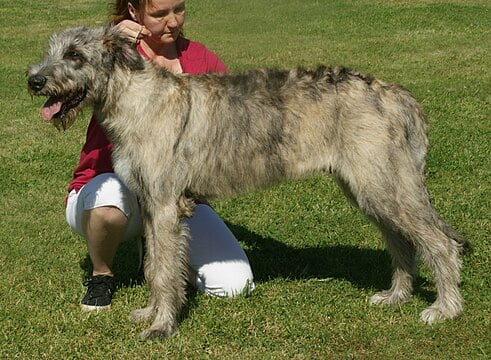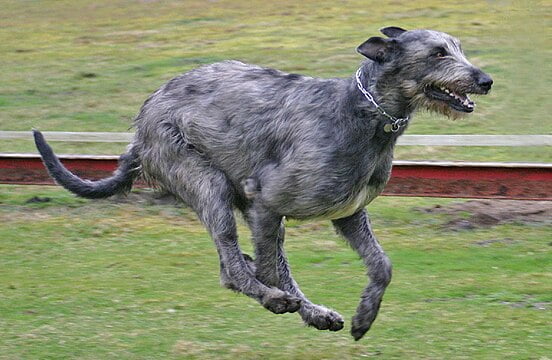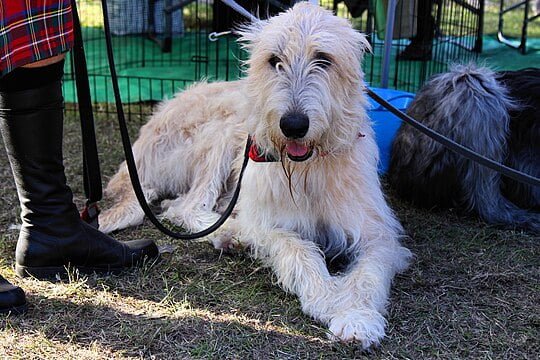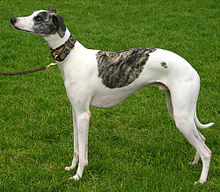
Emanating an aura of nobility and grace, the Irish Wolfhound is a breed that stands tall not just in stature but also in history. Heralding from the Emerald Isle, these hounds were originally used in war, to drag men off chariots, and to hunt wolves. Their towering frame is matched by a heart full of gentleness, making them “gentle giants” in every sense. With a rough, wiry coat and soulful eyes, the Irish Wolfhound carries an ancient legacy yet fits seamlessly into modern family life, providing both companionship and gentle guardianship.
The Irish Wolfhound is a member of the AKC Hound Group.
Breed Characteristics
| Dog Breed | Irish Wolfhound |
| Breed Popularity (AKC) | 89 |
| Country of Origin | Ireland |
| Personality | Gentle, loyal, intelligent, good-natured |
| Life Expectancy | 6-8 yrs |
| Height | 30-32 in |
| Weight | 105-120 lbs |
| Color | Grey, Red, Black |
| Coat | rough and hard on the head, body and legs; beard and hair over eyes particularly wiry |
| Shedding | Seasonal |
| Grooming | Weekly Brushing |
| Health Problems | Hip dysplasia, heart conditions, cancer |
| Trainability | Independent |
| Exercise Needs | Regular Exercise |
Irish Wolfhound History
As the name suggests, the Irish Wolfhound hails from Ireland and is a historic sighthound. Originally used to hunt wolves and elk, these dogs have been praised in ancient Irish literature for their bravery and skill. Standing as the tallest of all AKC breeds, the Irish Wolfhound is recognized for its gentle demeanor, making it a beloved family companion despite its imposing size.
Temperament
Irish Wolfhounds, known as gentle giants, are among the tallest dog breeds. They are moderately intelligent and exhibit a calm demeanor. Their behavior leans towards being affectionate and protective. They have a moderate energy level, given their size, enjoying relaxed activities. Socialization helps maintain their gentle nature. Their barking tendencies are low, but their deep bark is unmistakable when they choose to vocalize.
Remember, while breed traits provide a general idea, individual dogs can have personalities that differ from the breed standard. Always spend time getting to know the dog and ensure their needs and temperament align with your lifestyle.
Grooming Requirements
Irish Wolfhounds have a rough, wiry coat that requires regular brushing to remove dead hair and prevent matting. Bathing with a dog shampoo suitable for coarse hair can be beneficial. Routine grooming activities, including nail trimming, ear checks, and periodic coat stripping to maintain texture, are vital for this giant breed.
Irish Wolfhound Health
Irish Wolfhounds have a shorter lifespan of 6-10 years. They can be prone to conditions like bloat and heart disease. Regular health checks, vaccinations, flea prevention, and deworming are necessary. Their diet should be of high quality to maintain their large size, and potential allergies should be monitored.
Exercise Needs
Irish Wolfhounds, despite their large size, have a calm demeanor. Regular moderate walks and structured play sessions are enough for their exercise needs. They might appreciate dog park visits for socialization, but interactions should be observed due to their hunting instincts. Calm bonding activities and spacious playtime areas suit this gentle giant.
Training
Irish Wolfhounds, celebrated for their stature and gentle nature, thrive under patient obedience training. Commands play a significant role in potty training, given their size. Crate training, albeit with adequately sized crates, offers a serene retreat. Addressing behavior problems, especially those related to their sighthound instincts, is essential. Regular socialization ensures they remain sociable giants.
Irish Wolfhound Pictures



Related Dog Breeds
More Dog Resources
Are you thinking about getting a puppy? Make sure to check out our list of important questions to ask before you adopt a puppy.
We also have many resources to help, from naming your puppy to socialization resources and training tips.
Take me back to the Ultimate Guide to Dog Breeds



